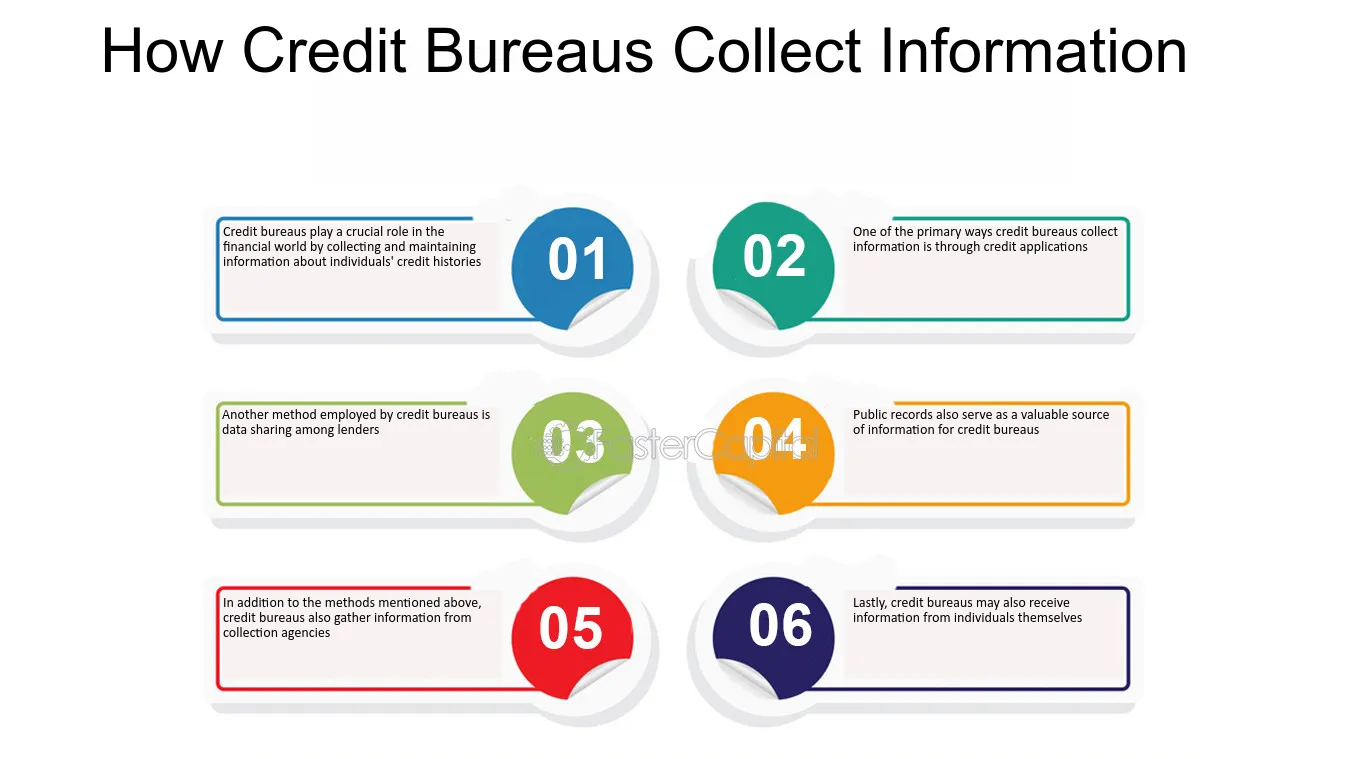Credit card refinancing vs. Debt consolidation. What is the difference?
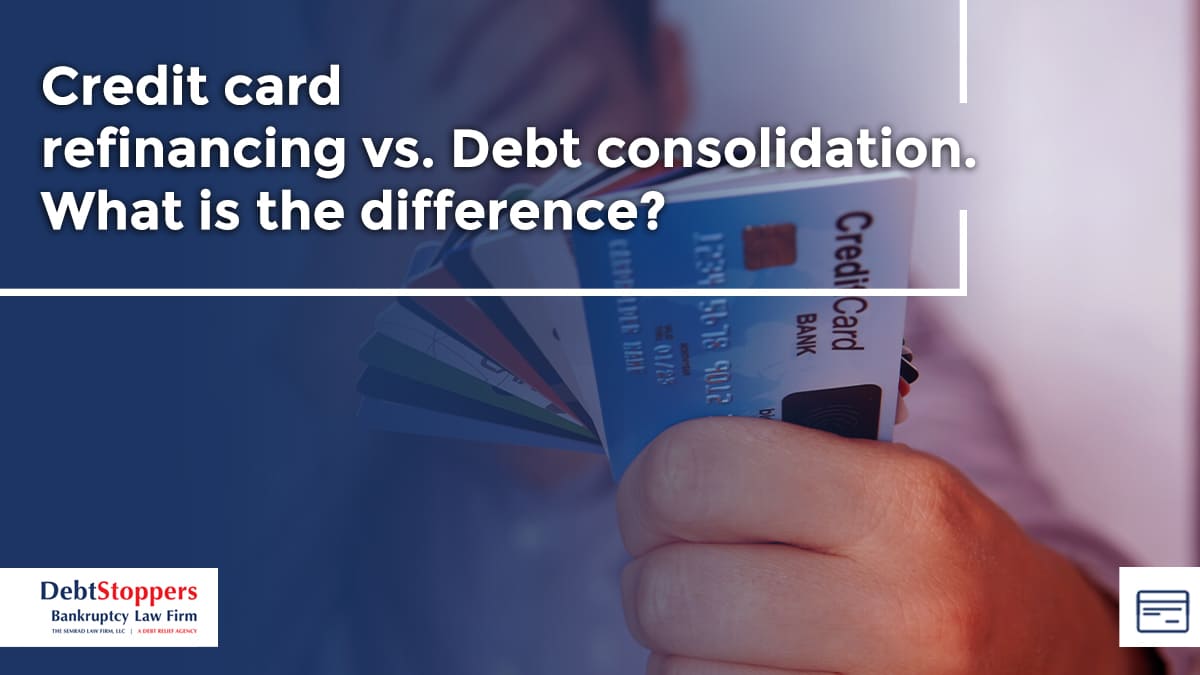
Credit card refinancing and debt consolidation are both strategies for managing debt, but they involve different processes and outcomes.
Credit card refinancing specifically targets credit card debt and involves transferring the balances from one or more existing credit cards to a new credit card account. The primary goal of credit card refinancing is to reduce the cost of carrying credit card debt by securing a lower interest rate or promotional period with 0% APR.
Debt consolidation can encompass various types of debt, including credit card debt, personal loans, medical bills, etc. Debt consolidation involves combining multiple debts into a single loan or repayment plan. The primary goal of debt consolidation is to streamline debt repayment, simplify finances, and potentially reduce the overall cost of borrowing by securing a lower interest rate or more favorable repayment terms.
Both credit card refinancing and debt consolidation aim to simplify debt repayment and potentially reduce the cost of borrowing, but they employ different methods to achieve this goal. It’s essential to understand the differences between the two and choose the approach that best suits your needs and financial goals.
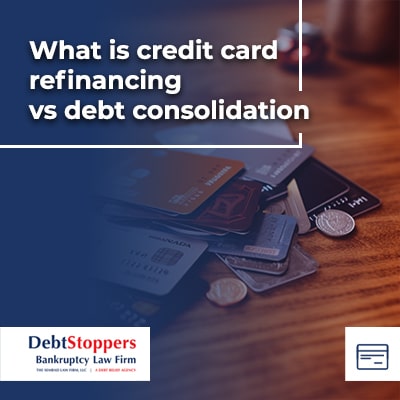
What is credit card refinancing vs debt consolidation
Credit card refinancing and debt consolidation are both strategies for managing credit card debt, but they involve different processes and outcomes. Here’s a comparison of credit card refinancing and debt consolidation.
Credit card refinancing
Credit card refinancing is also known as a balance transfer. Credit card refinancing allows you to transfer the balances from one or more existing credit cards to a new credit card account, typically with more favorable terms. The primary goal of credit card refinancing is to take advantage of lower interest rates, promotional offers, or better repayment terms to reduce the cost of carrying credit card debt.
Credit card refinancing can be a useful strategy for reducing the cost of credit card debt and paying off balances more efficiently. However, it is imporant to consider the terms and conditions of the new credit card, including interest rates, fees, and repayment terms, to ensure that refinancing is the right choice for your financial situation. Additionally, it is also important to avoid accumulating new debt on the new credit card and focus on paying off the transferred balances to achieve long-term financial stability.
Debt consolidation
Debt consolidation is a financial strategy that combines multiple debts, such as credit card balances, personal loans, or medical bills, into a single loan or repayment plan. The primary goal of debt consolidation is to streamline debt repayment, simplify your finances, and potentially reduce the overall cost of borrowing by securing a lower interest rate or more favorable repayment terms.
Debt consolidation can be an effective strategy for managing multiple debts and reducing the financial burden of high-interest debt. However, it is essential to carefully consider the terms and conditions of the consolidation method you choose and make a plan to repay the debt responsibly to achieve long-term financial stability.
What is the difference between credit card refinancing and debt consolidation?
The main difference between credit card refinancing vs debt consolidation is that credit card refinancing specifically targets credit card debt and debt consolidation can be used for other types of debt as well.
Additionally, credit card refinancing simply transfers the balance from one credit card to another credit card with more favorable terms. On the other hand, debt consolidation typically involves securing a personal loan.
What Are the Pros of Credit Card Refinancing?
The pros of credit card refinancing include saving money, low or no interest charges during an introductory period, and the ease of refinancing your debt.
Save money
One of the primary reasons for refinancing credit card debt is to secure a lower interest rate. By transferring balances to a credit card with a lower APR (Annual Percentage Rate), you can reduce the interest you pay over time. This means more of your monthly payments go toward paying down the principal balance rather than interest charges, allowing you to pay off the debt faster and save money in the long run.
If you’re currently carrying balances on credit cards with high penalty APRs triggered by late payments, refinancing can help you avoid these penalty rates. By transferring balances to a new card with better terms, you can prevent your interest rates from skyrocketing due to late payments.
Overall, credit card refinancing can save money by reducing interest rates, taking advantage of promotional offers, simplifying payments, avoiding penalty rates, and reducing total interest costs over time. However, it’s essential to carefully consider the terms of the new credit card and have a plan to repay the debt and maximize your savings.
No interest charges
Many credit card issuers offer promotional periods with 0% APR on balance transfers for a certain timeperiod. During this promotional period, you can pay off your transferred balances interest-free, and save money on interest charges entirely during that time.
By taking advantage of promotional periods, you can reduce the total amount of interest you pay over the life of the debt. This can result in significant savings, especially if you pay off the transferred balances before the promotional period ends.
Easy Refinancing
Credit card refinancing can be relatively easy for people with good credit with access to attractive balance transfer offers. However, it’s essential to consider factors such as credit score, credit history, fees, and available offers to determine the ease and suitability of refinancing.
Your credit score plays a significant role in determining your eligibility for credit card refinancing. Generally, people with higher credit scores are more likely to qualify for lower interest rates and better balance transfer offers.
The availability of attractive balance transfer offers can impact the ease of credit card refinancing. Lenders periodically introduce promotional deals, such as 0% APR balance transfer offers for a limited time. If you come across a compelling offer that aligns with your financial goals, the refinancing process may be relatively straightforward.
While balance transfer offers can provide savings on interest charges, many credit cards impose balance transfer fees, typically ranging from 3% to 5% of the transferred amount. These fees can add to the cost of refinancing and affect its overall ease, particularly if they’re substantial.
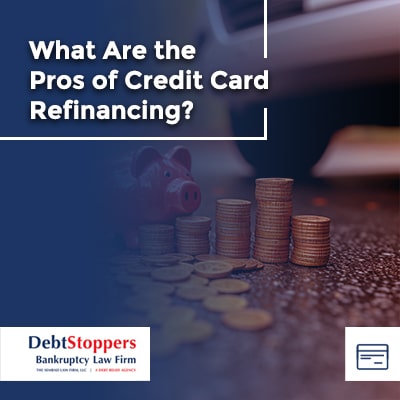
What Are the Pros of Debt Consolidation?
Debt consolidation can be an effective strategy for managing multiple debts and achieving financial stability. Some of the pros of debt consolidation include a simplified repayment process, lower interest rates, fixed monthly payments, and/or a shorter repayment period.
Low interest rates
Debt consolidation can potentially lower the overall interest rate on your debts, especially if you consolidate high-interest credit card debt into a lower-interest loan. By reducing the interest rate, you can save money on interest charges over the life of the loan, allowing you to pay off the debt more quickly.
Fixed monthly payments
Debt consolidation loans typically come with fixed repayment terms, meaning you’ll have a set monthly payment amount and a specific timeline for paying off the debt. This predictability can make it easier to budget and plan for the future, as you’ll know exactly how long it will take to become debt-free.
Short repayment period
Debt consolidation can potentially lead to a shorter repayment period but this isn’t always the case. Whether debt consolidation results in a shorter repayment period depends on several factors, including the terms of the consolidation loan or repayment plan, your financial situation, and your ability to make consistent payments.
If you consolidate high-interest debts into a consolidation loan with a lower interest rate, more of your monthly payments will go toward reducing the principal balance rather than paying interest. As a result, you may be able to pay off the debt more quickly, leading to a shorter repayment period.
Additionally, debt consolidation loans typically come with fixed repayment terms, such as a specific number of months or years to pay off the loan. By having a set repayment timeline, you’re motivated to make consistent payments and pay off the debt within the specified period, potentially leading to a shorter repayment period.
If you’re able to consolidate your debts into a single loan with a manageable monthly payment, you may choose to pay more than the minimum required each month. By making higher monthly payments, you can accelerate the repayment process and pay off the debt more quickly, shortening the repayment period.
How can Debtstoppers help you with credit card refinancing and debt consolidation?
If you are struggling to manage your debt, the experienced attorneys at Debtstoppers can provide valuable assistance with credit card refinancing and debt consolidation in several ways.
- Legal Advice and Guidance – Our attorneys can assess your financial situation, including your debts, assets, income, and expenses, and provide personalized legal advice on the most suitable debt relief options for your circumstances. We can explain the pros and cons of credit card refinancing, debt consolidation, and other alternatives, helping you make informed decisions about how to manage your debts effectively.
- Evaluation of Bankruptcy Options – If your financial situation is severe and other debt relief options are insufficient, Debtstoppers can evaluate whether bankruptcy is a viable solution for your debts. Our experienced attorneys can explain the different types of bankruptcy, such as Chapter 7 and Chapter 13, and help you understand the eligibility criteria, benefits, and consequences of each option.
- Assistance with Bankruptcy Proceedings – If you decide to pursue bankruptcy, Debtstoppers can guide you through the entire bankruptcy process, from preparing and filing the necessary paperwork to representing you in court hearings and negotiations with creditors. We can ensure that your rights are protected and help you navigate complex bankruptcy laws and procedures.
- Negotiation with Creditors – Our team of bankruptcy attorneys can negotiate with creditors on your behalf to obtain more favorable terms for credit card refinancing or debt consolidation. The attorneys at Debtstoppers can advocate for lower interest rates, reduced balances, waived fees, or extended repayment periods, helping you achieve a more manageable and affordable debt repayment plan.
- Legal Protection – Working with a bankruptcy attorney can provide legal protection and representation in case of disputes or legal issues related to credit card refinancing or debt consolidation. Debtstoppers can review loan agreements, contracts, and other legal documents to ensure that your rights are protected and that you understand the terms and conditions of any debt relief arrangement.
- Financial Counseling – In addition to legal assistance, Debtstoppers offers financial counseling and budgeting advice to help you improve your financial literacy, manage your finances more effectively, and avoid future debt problems. We can provide practical strategies for budgeting, saving, and rebuilding your credit after bankruptcy or debt consolidation.
Debtstoppers has helped thousands of people with credit card refinancing and debt consolidation. Our team of attorneys can help you navigate the complexities of credit card refinancing, debt consolidation, and bankruptcy, guiding you toward the best possible outcome for your financial situation. Whether you’re seeking to restructure your debts, eliminate them through bankruptcy, or explore alternative solutions, a knowledgeable and experienced attorneys at Debtstoppers can provide valuable support and advocacy every step of the way.
By Patrick Semrad | Published June 11 2024 | Posted in Illinois Georgia Texas
Related blog posts

10 Bank Accounts You Can Open Even if You Have Bad Credit
Are you considering bankruptcy but worried about how it will affect your future financial opportunit.
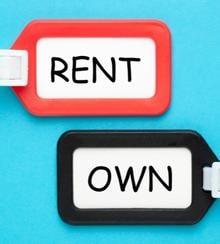
Rent-to-Own Stores
Rent-to-own stores let you buy new and used appliances, furniture and electronics under long-term pa.
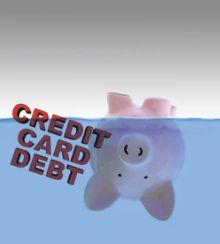
How to Pay Off Credit Card Debt with No Money
Credit card debts can be a burden for many Americans. If you’re struggling to make ends meet, you ma.
Credit Card Refinancing vs Debt Consolidation: Pros & Cons

Credit cards allow quick and easy financing to help you pay for necessities and spread the burden of more expensive purchases over several months. All that convenience, however, can come at a price. It’s often far too easy to borrow more than you can easily repay.
Credit card refinancing and debt consolidation both offer popular ways to manage high or unsustainable credit card debt. We take a look at how each option works and why one or the other might be better for helping you escape a credit card debt trap.
Taking Charge: Refinancing vs. Consolidation
If you’re struggling to keep up with snowballing credit card debt or juggling balances on two or more cards to make your monthly payments, it’s time to take action.
Failing to take it seriously can saddle you with long-term debt and prevent you from reaching your financial dreams. Any plan to manage your debt better starts with a budget and a commitment to stick to it. However, you also need a manageable plan to pay back what you already owe.
For most people, this involves choosing between credit card refinancing and consolidating your debt. Let’s examine each of these options in turn and consider which might be best for you.
What Is Credit Card Refinancing?
Credit card refinancing involves moving balances you have accumulated on one or more existing credit cards to a new card with a lower interest rate or other features that make it easier to pay off your existing balance.
The high-interest rate charged by most credit cards means balances can grow quickly, especially if you only make minimum monthly payments on your accounts. And, because those rates are variable, your monthly payments can increase rapidly if market interest rates rise.
This makes it easy to get caught off guard by credit card payments. If you find you are paying more than you can easily afford or need to use one card to pay off balances on the other, then credit card refinancing can offer a timely way to get your debt under control.
How Does It Work?
Credit card refinancing involves opening a card with a lower annual percentage rate (APR) than your existing cards and using this card to pay off what you owe on those original cards. Ideally, you’ll pay less each month and you will only have one bill to monitor, manage, and pay.
You’ll use your new card to pay off your card debts by carrying out an existing balance transfer. Almost all cards allow you to transfer balances, but when choosing a card for your refinancing be sure that:
- The spending limit on your new card is high enough to allow you to transfer your existing debt
- The card does not charge excessive fees for each transfer
In fact, many “balance transfer” cards offer features that make it easier to move balances to your new card, especially during the “introductory” few months after you open your account. Look especially for cards that offer special introductory period perks including:
- No charge on balance transfers
- No interest on your balance (0% APR)
- Cash, or other rewards, for charging a certain amount to the card in this period
You can carry out your balance transfers by contacting the card’s issuer and providing the details of the cards you want to move money from. Used wisely, a balance transfer card can help you reduce or possibly even pay off your debt in the first few months that you have it.
Refinancing your credit card in this way can make your payments more manageable and put you on the path to paying off your debt, but only if you consistently lower your balance by paying the full amount due each month.
Pros and Cons of Credit Card Refinancing
Credit card refinancing offers advantages and some potential drawbacks as a way to manage and ultimately pay off credit card debt. Significant benefits of credit card financing include:
- Replacing multiple debts with a single monthly payment
- A lower interest rate on your card payments
- 0% APR during your card’s introductory period
- Cash or other rewards for using your card during the introductory period
- An improved credit score due to a higher debt-to-borrowing ratio
At the same time, some potential disadvantages of credit card refinancing include:
- Limited introductory periods (usually 6-21 months)
- Potentially high balance transfer fees
- Interest rates remain relatively high
- Difficulty finding a lower APR if your credit is poor
- The risk that you will simply continue charging new purchases to your cards while making only minimum payments
What Is Debt Consolidation?
Debt consolidation involves taking out a single personal loan and using it to pay off several outstanding credit card debts. By replacing credit card balances with one, predictable monthly payment you are also making your budgeting every month a little easier.
Debt consolidation is a long-term solution to excessive credit card debt. To make it work, you must be willing to live within your means and make consistent payments on your loan, possibly for many years to come.
How Does It Work?
Debt consolidation replaces the variable rates and consistently accumulating balances of your credit cards with a single monthly bill.
Unlike a credit card, a personal or debt consolidation loan is not revolving credit. You will not be able to charge more money to your account balance and you will need to pay the full amount due on your loan payment every month.
In most cases, the loan you take out to pay off your outstanding credit card balances will have a significantly lower rate than your credit cards. You will still pay a significant amount in interest charges over the term of your loan but your monthly payment will be more manageable.
The real benefit that debt consolidation brings is predictability and certainty. By knowing what you owe, when you need to pay it each month, and how long you will need to make payments, you can make plans for your future and begin saving toward other financial goals.
Taking out a personal loan is relatively straightforward. In most cases, you require no collateral (a fixed asset the lender can seize if you fail to repay your loan) and you receive the full lump sum you borrow into your checking account almost immediately.
This money is used to pay off the entire amount outstanding on all your cards, so you are free of high-interest variable rate debt. The fixed rate on your personal loan means your payments will stay the same until the loan is paid off, even if rates increase.
If your credit score is low, you might struggle to qualify for a personal loan or access the best interest rate on the money you borrow. However, even paying off a relatively high rate over time is more effective than continuing to juggle ever-increasing minimum payments on your cards.
Pros and Cons of Debt Consolidation
Consolidation offers significant advantages as a way out of unmanageable debt, but also comes with some drawbacks, especially if you are used to spending freely. Important advantages of debt consolidation using a personal loan include:
- You make a single, predictable monthly payment
- Your interest rate and monthly payment are fixed
- You save money on interest payments over time
- You can begin to budget effectively and plan for other priorities
- Your credit score will improve as you reduce high-interest debt
Debt consolidation also comes with some disadvantages, especially if you are not comfortable with a long-term financial commitment. Some important potential drawbacks include:
- You need to make full loan payments every month
- You may have to pay off your loan over several years
- You will still pay significant interest, but over a longer period
- A poor credit score may make it hard to qualify for a loan or access a good rate
- There is nothing to stop you from running up further credit card debt
The following table summarizes the key differences between credit card refinancing and debt consolidation.
| Credit Card Refinancing | Debt Consolidation | |
|---|---|---|
| Goal | Manage debt by reducing card balances and lowering APR | Consolidate and pay off credit card debt |
| Interest Rate | Lower than credit card rates, especially for balance transfer promotions | Lower than credit card rates, depending on market and credit score |
| Monthly Payment | Varies, based on interest rate, balance, and repayment terms | Fixed monthly payment for the loan duration |
| Loan Term | Open-ended. Balance transfer promotions from 6-21 months | Typically ranges from 1 to 7 years, depending on the loan terms |
| Fees | Balance transfer fees may apply | Origination fees may apply |
| Credit Impact | May lower credit score due to opening a new credit account | May boost score by improving credit utilization and credit mix |
Refinance or Consolidate: What’s Right for You?
Refinancing your credit cards and consolidating debt into a personal loan are both effective ways to manage credit card debt. However, they are also both significantly different approaches to debt that work best in different situations.
Let’s take a closer look at what sets these approaches to credit card debt apart and how this affects where they are best used.
Credit Card Refinancing
Choosing to refinance your debt by moving it to a lower-rate balance transfer card signals an intention to lower your overall credit card debt by reducing what you pay in interest charges. However, it also suggests that you plan to continue to use your credit card in the future and that while your credit card debt may be high, you consider it to be sustainable.
Refinancing your debt is more about saving money on interest and taking advantage of perks for transferring balances.
With this in mind, it’s best to think of credit refinancing as a shorter-term strategy to reduce and manage your credit card debt rather than eliminate it. It’s a good strategy if:
- You have stable employment with good prospects
- You have a workable monthly budget
- You are able to make more than minimum payments if necessary
- You plan to continue to use your card but want to save money on interest payments
Debt Consolidation
Debt consolidation involves a more serious commitment to eliminating credit card debt altogether. Choosing to turn the flexibility of short-term, high-interest revolving debt into a longer-term fixed loan signals a willingness to change your financial outlook for good.
Debt consolidation makes the most sense if you believe your credit card debt is unsustainable and poses a threat to your long-term financial future. It’s a good strategy if:
- If you are struggling to make minimum payments on one or more cards
- You are willing to stop using your credit cards, at least for now
- You want to build better financial habits
- You want to plan for your long-term financial future
Debt consolidation is a proven route out of unmanageable credit card debt. It works well when it’s part of a wider commitment to financial responsibility, including making and keeping a budget and controlling your spending.
Build a Better Future With Jeanne D’Arc Credit Union
Debt consolidation is a deep commitment to a better financial future. Still not sure what’s right for you? Through a partnership with GreenPath Financial Wellness, Jeanne D’Arc members can receive Debt Management Counseling Services where an experienced financial coach is available to help guide your decision so you can tackle your debt with confidence. By taking responsibility for your credit card debt today, you are building a solid foundation for future financial success.
At Jeanne D’Arc Credit Union, we offer our members simple, affordable, personal loans to reach their financial goals. If you’re looking to build long-term security for your family, cover education needs, or make a dream wedding or vacation a reality, our personal and debt consolidation loans will help you pay for it responsibly.
Our secured and unsecured personal loans offer:
- Lump sum borrowing of up to $15,000
- Terms of 1-5 years
- No application fees
- No prepayment penalties
- Skip-a-Payment program for when money is tight
Taking charge of your debt today allows you to start saving for a more secure tomorrow. Contact Jean D’Arc today to learn how we can help, or click below to find out more about our debt consolidation loans.
https://www.debtstoppers.com/blog/credit-card-refinancing-vs-debt-consolidation-what-is-the-difference/https://www.jdcu.org/blog/credit-card-refinancing-vs-debt-consolidation/

